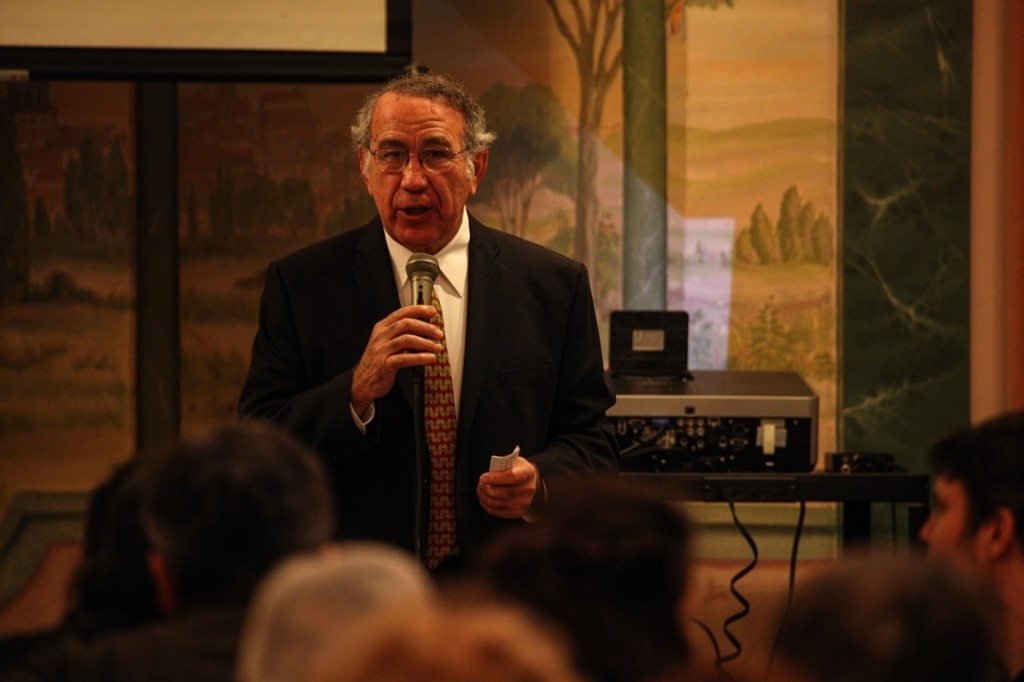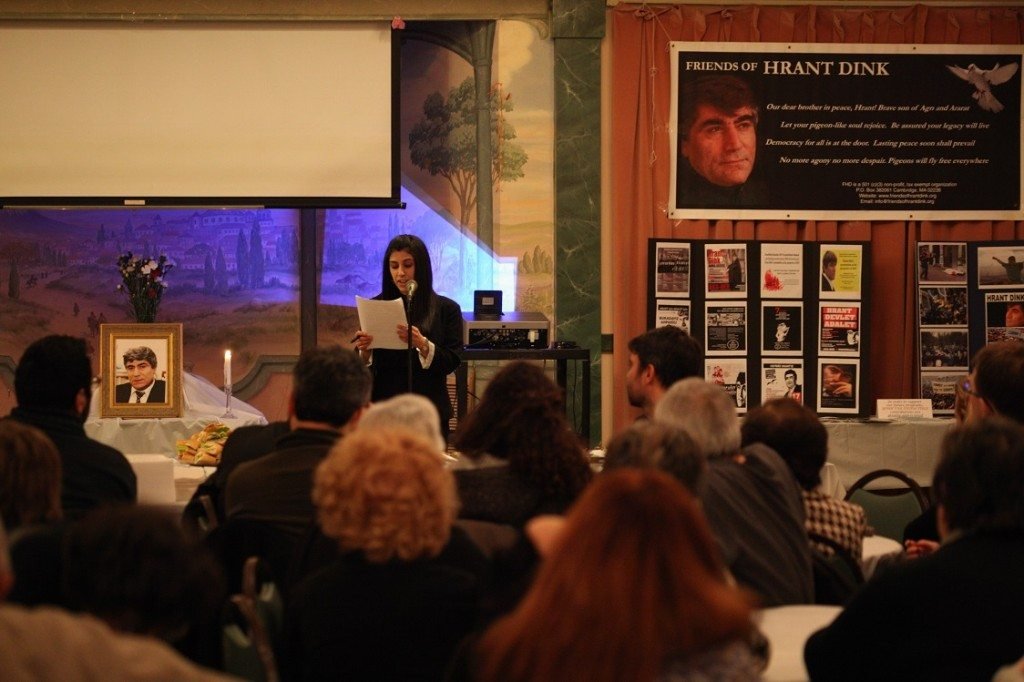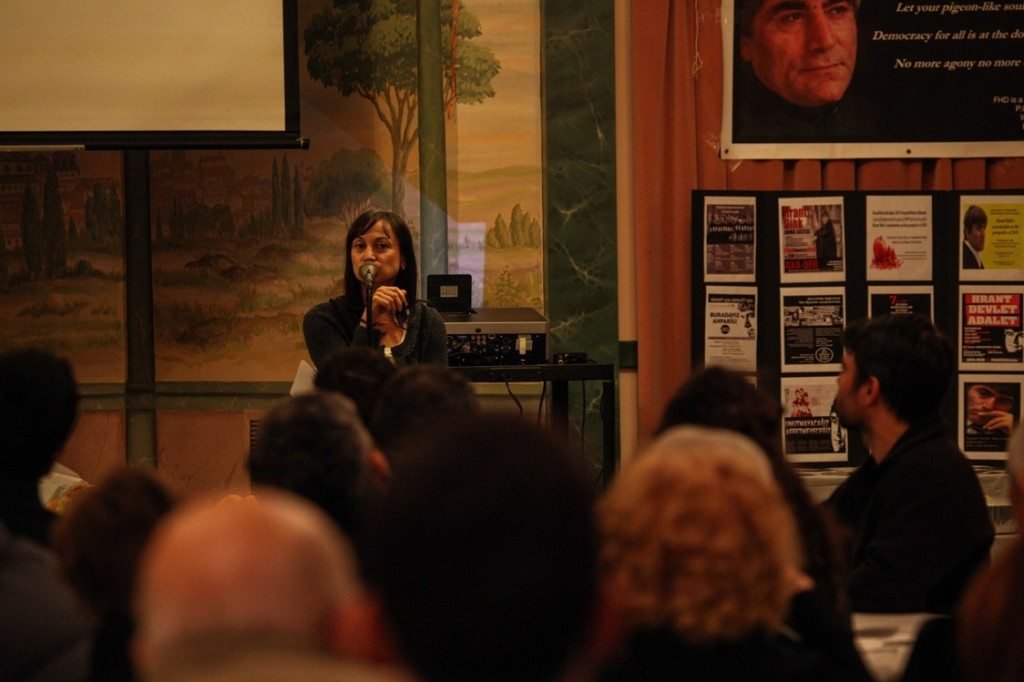
WATERTOWN, Mass. (A.W.)—On the 7th anniversary of Turkish-Armenian journalist Hrant Dink’s assassination on Jan. 19, the Friends of Hrant Dink organization hosted a memorial coffee hour in Dink’s memory, following church services at the St. James Armenian Apostolic Church.
President of Friends of Hrant Dink Harry Parsekian thanked those gathered to reflect on Hrant Dink’s legacy, and justice that still hasn’t been served. He then proceeded to introduce the first speaker, Armenian Weekly assistant editor Nanore Barsoumian.
Following Parsekian’s words, the organizers played a moving recording of “Dle Yaman” performed by Isabel Bayrakdarian, while images from Dink’s funeral rotated in the background.

Barsoumian then shared her reflections on Dink’s legacy. (Read full text here.) She said that instead of silencing one man, the bullets that hit Dink gave rise to thousands of voices who vowed to continue Dink’s work. She said Dink was both feared and seen as an enemy of the state, even as he himself felt like a frightened dove. She repeated what Dink had considered his mission: to struggle against injustices, to demand the rights and the history of the Armenians, and to build a democratic country. She also talked about Dink’s work through Agos, and about the importance of telling the stories of the hidden and Islamized Armenians—stories Hrant encountered regularly. Those stories are missing from the Armenian narrative on the Genocide and they need to be included, she said, as they also shed light on the Armenian identity. Hrant mirrored the failure of the state, she said, his work went against the country’s policy of Turkification. Hrant’s legacy speaks to Armenians, Turks, and Kurds alike—it is a legacy of optimism, persistence, and struggle.
Gonca Sonmez-Poole, a member of the Turkish Armenian Women’s Association that aims to foster dialogue between Turks and Armenians, took the stage next. She said prior to Dink’s assassination she had never thought to question the official state narrative on the Armenian question. Dink’s death changed her outlook. She spoke about the importance of talking to one another, to engaging in dialogue. She said whereas before Dink’s death she had never approached Armenians, afterwards, she felt she had to go to every Armenian event she could attend. Dink’s death was in short, a life changing event for her.

The event came to a close with concluding remarks from Parsekian, followed by a few words from co-organizer Zadik Ozcan, who presented the speakers with a framed picture of Dink that bore a tribute to his legacy. Ozcan also presented the speakers with copies of the documentary “Don’t Get Lost Children” (“Kaybolmayin Cocuklar,” in Turkish), which is about the Tuzla Armenian children’s camp where Dink spent his childhood, and met and married his wife. The camp was confiscated by the state in 1984.
Roughly 200 people participated in the memorial event, including some members of the local Turkish American community. Soon after the event concluded, Umit Kivanc’s documentary “For Hrant, for Justice!” was shown at the Watertown Public Library. The event was co-organized by Friends of Hrant Dink and Bostonbul, a grassroots organization founded by Turkish American activists in June 2013, in solidarity with the Gezi park protesters. Following the movie screening, Zadik Ozcan, Dink’s childhood friend and classmate shared some of his memories from his childhood days. He concluded his talk with the following words: “The water found its crack. To me, Hrant was like running water in life and even in death… Given enough time, water can break down all barriers to find its destination, its crack… We should honor and strive to continue Hrant’s legacy, to correct the wrongs of history and to someday achieve his dream of a truly just and democratic Turkey for all—Turks, Kurds, and Armenians—and to live in peace…”


Be the first to comment